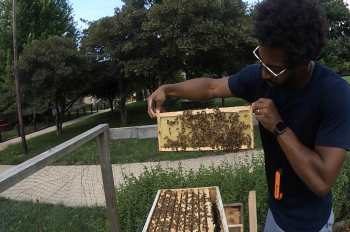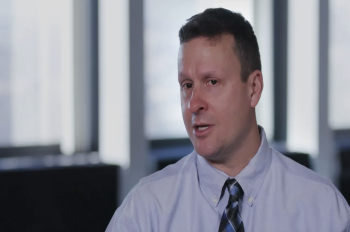Physics Graduate Students Receive Recognition for Breakthrough Technology for Particle Accelerators
Physics graduate students Mattia Checchin and Martina Martinello have been working at nearby Fermi National Accelerator Laboratory (FNAL) on a breakthrough technology for particle accelerators using superconducting radiofrequency (SRF) cavities. Their Ph.D. research on the electromagnetic and thermal properties of these cavities has led to multiple invited talks at international conferences as well as prizes and other recognition.
SRF cavities, typically using superconducting niobium (Nb), have orders of magnitude lower RF impedances than normal metals such as copper and are thus an enabling device for large scale accelerators such as the Large Hadron Collider where the Higgs boson was discovered. The performance metric for SRF cavities is the quality factor, Q, a measure of the stored energy that can be transferred to the electron or proton beam. However, using the standard processing recipe for Nb developed over the past 40 years, it is found that the value of Q, while initially high, tends to decrease with increasing accelerating fields. A new nitrogen processing technique developed by FNAL physicists Anna Grassellino and Alex Romanenko shows a stunning reversal of this trend; the Q actually increases with accelerating fields, to record high values at fields near 20 MV/m. This has opened the door to new applications of such SRF cavities, including a new, ultrabright X-ray light source, a free electron laser, which will be built at the Stanford Linear Accelerator (SLAC).
Transferring the new technology to real accelerator modules has been the focus of Checchin and Martinello’s research at FNAL. Chechhin has studied new ways to remove unwanted trapped magnetic flux, and Martinello has developed the proper cooling steps and use of thermal gradients to maximize performance. Checchin presented his work as an invited talk at the international SRF conference in Whistler, B.C., in 2015, where he also won top prize in the student poster competition. Martinello will give an invited talk at the April meeting of the American Physical Society and is on the short list for the Mark Oliphant Prize at the International Particle Accelerator Conference (IPAC) in Busan, Korea. Checchin has received a travel award to IPAC. Both will be giving invited talks at the upcoming Linear Accelerator conference in 2016.
John Zasadzinski, Paul and Suzi Schutt Endowed Chair of Science and Checchin and Martinello’s Illinois Tech advisor, commented, “it is safe to say that nearly all future particle accelerators will take advantage of some aspect of the research that these two students are doing. It is rare for graduate students to give even one invited talk at an international conference. For Martina and Mattia to do this multiple times, plus win, or be nominated for, other awards and grants, is truly remarkable. It is a testament to their hard work and diligence, as well as the expert guidance given by Anna and Alex at FNAL.”




